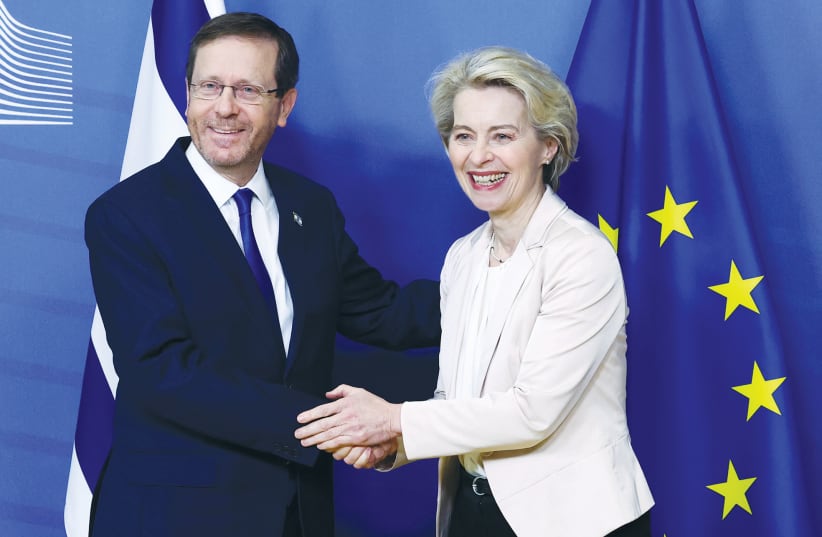The EU holds that this resolution must be based on the pre-1967 lines with east Jerusalem as the capital of a Palestinian state.
TOVAH LAZAROFF JANUARY 20, 2024 22:49
Updated: JANUARY 21, 2024 00:10

European Union foreign ministers plan to hold back-to-back meetings in Brussels on Monday with their counterparts from Israel, Saudi Arabia, Jordan, and Egypt, and with Arab League Secretary-General Ahmed Aboul Gheit.
The talks are scheduled to take place within the context of the EU foreign ministers’ monthly meeting, which will include a focus on the Gaza war, including the humanitarian situation and the importance of a day-after plan for the Strip.
The ministers will discuss “a possible peace plan and peace conference and the need for concrete steps to revive the two-state solution, including through continued support for the Palestinian Authority,” the EU said in a statement.
The importance of securing the release of the 132 hostages held in Gaza, the Houthi threat on Red Sea shipping, and the overall danger of regional escalation, will also be on the agenda, it said.
EU holds firm to two-state solution
EU foreign policy chief Josep Borrell, who visited Israel in November, has called for the bloc of 27 European countries to become more actively involved in pursuing a two-state resolution to the conflict.
EU FOREIGN Policy Chief Josep Borrell addresses a plenary session of the European Parliament in Strasbourg, France, last week. Borrell has condemned Israel, claiming there is no evidence of wrong-doing by the seven NGOs closed by Israel. (credit: YVES HERMAN/REUTERS)
The EU maintains that this resolution must be based on the pre-1967 lines, with east Jerusalem as the capital of a Palestinian state.
Borrell has spoken of the possibility that a resolution to the conflict must be imposed on Israelis and Palestinians.“We only believe a two-state solution imposed from the outside would bring peace, even though Israel insists on the negative,” he said Friday during a speech at Valladolid University in Spain.
Israel had financed the creation of Hamas, Borrell said, contradicting Prime Minister Benjamin Netanyahu, who has denied such allegations.
Opponents of the Israeli government and some global media outlets have accused Netanyahu’s governments of boosting Hamas for years, including by allowing Qatari financing to enter Gaza.
“Yes, Hamas was financed by the government of Israel in an attempt to weaken the Palestinian Authority led by Fatah,” Borrell said.
Israel has criticized various countries, including Borrell’s native Spain, for what it says is showing sympathy for Hamas.Separately, the EU on Friday imposed asset freezes and travel bans on six people it said were linked to Hamas, under a new sanctions regime targeting the terrorist group.
The EU already listed Hamas as a terrorist organization, but it moved to create a legal framework focused on the group after the October 7 massacre.
The list could be widened to target “all those who support, materially or financially,” Hamas or Islamic Jihad, said the Council of the European Union, which represents the bloc’s member states.
The council listed those sanctioned as Sudan-based financier Abdelbasit Hamza Elhassan Mohamed Khair, Nabil Chouman, his son Khaled Chouman, senior Hamas financier Rida Ali Khamis, senior Hamas operative Musa Dudin, and Algeria-based financier Aiman Ahmad Al Duwaik.
Arms trading, supporting actions undermining the stability or security of Israel, and involvement in serious humanitarian law or human-rights breaches were cited as possible reasons for sanctioning.
“The new sanctions framework shall apply until 19 January 2025,” the council said in a press release. “It shall be kept under constant review and renewed or amended as appropriate.”
A senior EU official earlier on Friday said the first batch of sanctioned individuals was linked to providing funds to Hamas.
Content retrieved from: https://www.jpost.com/israel-news/article-783013.